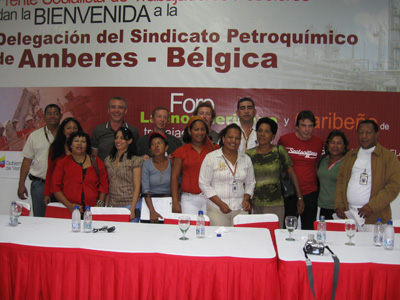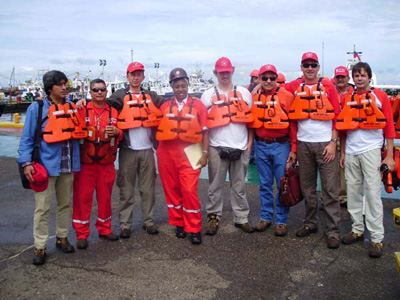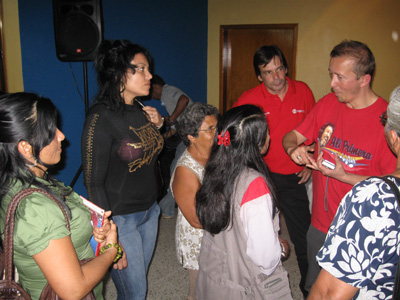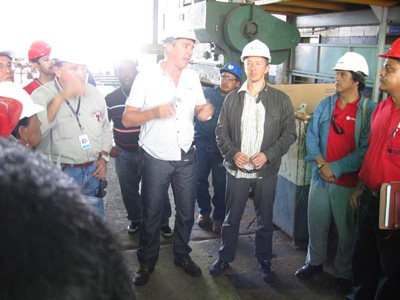First official Belgian trade union delegation to revolutionary Venezuela
- 23 September 2008
"El Frente Socialista de Trabajadores Petroleros da la bienvenida a la delegacion sindical petroquimica de Amberes." (The socialist front of oil workers welcomes the Union delegation of the petrochemical industry of Antwerp). Those words were written on a big banner at the entrance of the social club of the oil workers of the refinery in Puerto La Cruz. Special guests of the Frente Socialista were Kris Vandael spokesperson of the socialist union ABVV at the Total refinery in Antwerp, Ronny Le Blon (full time official of the Antwerp Union and former spokesperson of ABVV Total), Freddy Pulecio (Colombian trade unionist of the USO oil workers' union and living in exile in Belgium) and Erik Demeester of the Hands Off Venezuela campaign.
 |
| Belgian delegation with union and community leaders in Puerto La Cruz |
Our visit to the refinery in Puerto La Cruz was the final point of an intense tour of ten days through the world of unions active in the new PDVSA (the nationalized oil company) and Pequiven (the public petrochemical industry). The tour included visits to a wide range of oil and petrochemical installations, instructive discussions with trade unionists, meetings on the shop floor with oil workers, gatherings with different managers (revolutionary and not), travelling people's assemblies with the spokespersons of the community councils and student leaders, short cultural moments and meetings with a great number of socialist activists (most of them from the PSUV) of the new revolutionary Venezuela. Our trip ran at high speed from Caracas to the steamy city of Maracaibo, then to the peninsula of Paraguana, later to Valencia back to Caracas and then again to Maturin/Monagas and finally Puerto La Cruz in the state of Anzoategui. Due to lack of time we had to cancel the visit to the Orinoco belt. During our visit we came across a picket line of striking General Motors workers in Valencia and also a demonstration of council workers of Caracas in front of the Presidential Palace.
International Solidarity
The socialist union of Antwerp (AC Antwerpen Waasland) has a good record of international solidarity. Apart from its ‘core business' in defending the day to day interests of its 30,000 members, the branch supports different projects with unions in Latin America, for instance in Colombia, where it supports the union of land workers. A few years ago the union decided also to give support to the days of solidarity with the revolution in Venezuela and also to the ‘Hands Off Venezuela' campaign. At the most recent federal congress of the socialist trade union ABVV/FGTB the branch also presented a motion of support for the new unions in Venezuela. So it was no surprise when the union of petrochemical workers of Antwerp accepted the invitation of the unions in Venezuela organized in the ‘Foro Energetico de Trabajadores de America Latina y del Caribe' (see http://www.foroenergetico.org/) to come and visit their country and the Bolivarian revolution. This visit was really a breakthrough. Not only because it was the first official trade union from Belgium visiting the country, but more important is the fact that this union and its branch in Antwerp organizes the workers in the biggest petrochemical cluster in Europe, the second biggest in the world just behind Houston in Texas. It was a visit from a small country but from a very strategic sector.
The New PDVSA
The importance of our visit did not go unnoticed in Venezuela. The press conferences, the reports in the local papers and television confirm this. Thanks to this trade union trip we got a good view of the revolution from within. In PDVSA we realized the strategic importance of the oil company for the revolution. For the first time indeed the oil profits have been used to finance a large panorama of social reforms - big and small, locally and nationally. Mision Ribas for instance is directly run and financed by PDVSA. This ‘Mision' guarantees free secondary education for young people as well as for adults. The oil company is also in charge of the new network of cheap food distribution established recently to combat the effects of artificial food scarcity and sabotage. Every district of PDVSA is also in charge of the development and financing of social projects.
 |
| Together with oil workers before leaving for a trip on Lake Maracaibo |
In the state (province) of Zulia, near the Maracaibo lake, Mision Barrio Adentro (free first medical aid) has revolutionized the health situation of the local population. Over a five-year period more than 46 million surgery visits have been made, with 6 million families visited by a doctor. It is estimated that some 40,000 lives have been saved thanks to this public health revolution. This is the revolution in practice. Mision Barrio Adentro has been made possible thanks to exchange of cheap oil for Cuban medical personnel and know-how. Due to the fact that the revolution has not been completed, PDVSA is still suffering from old bureaucratic habits, especially among certain layers of management. These have formally adapted themselves to the new regime but continue to function as before. Bureaucracy is of course much more than administrative labyrinths. The bureaucracy sabotages the social reforms, represses the democratic participation of the workers and the communities in decision-making. Sometimes it dares even to attack the unions. The bureaucracy holds on to its position in PDVSA because it claims to be technically irreplaceable.
Often, but not always, bureaucracy goes hand in hand with corruption. Corruption starts with acquiring and distributing all kinds of small and big privileges. It is true, that access to the very appreciated jobs in PDVSA have been democratised and become more transparent. Nevertheless some managers dare to invoke urgency to bypass the new democratic procedure. So they can ‘sell' temporary jobs just like in the old times of the old PDVSA. Effective workers' control would be the best way of rooting out corruption.
Putting an end to bureaucracy and corruption is one of the main challenges of the revolution over the coming months and years. This consciousness was clearly present in the people of the unions we met. In the Puerto La Cruz refinery, Maria, a local trade union leader, told us the following story. "The workers saved the refinery during the bosses' lock-out in 2002-03. Not even for one day did they succeed in stopping, productions thanks to our initiative. For two years we kept effective control over the refinery. The power we had at that time we lost. But we want it back." When we asked her if there were enough technically skilled or politically conscious workers to achieve this, Maria did not doubt a second. "No, that's not the problem. We are waiting for the right political moment." The problem of the bureaucrats in PDVSA who parade as real Chavistas is what is described as the Fifth Column (the Trojan Horse of the right wing). Real workers' control, as a step to effective workers' management by the workforce and the communities and the government, is the best cure against the cancer of the bureaucracy.
Women in the revolution
 |
| Discussion with spokespersons from community councils in Monagas |
One of the most remarkable moments of our visit to the revolution from within were the three meetings with the people from the neighbourhoods, especially with the spokespersons from the ‘community councils' (consejos comunales). The first thing that struck us was the dominant position of women elected in the community councils. And what kind of women! Referring to the record production of Miss Universe in Venezuela, the trade union leader Eudo commented: "Yes our women are maybe known in the whole world for their beauty. But we know them better for their courage, their revolutionary commitment, their consciousness and their determination in the revolution. Nothing of this side of our women is told in the world". Eudo of course is right. Women play a prominent role in the revolution. Especially in the neighbourhoods, the core of the popular movement, they are often the majority of the active participants. They told us how during the ‘coup d'état' in 2002 they were often getting their husbands out of the bars or from in front of the television to demonstrate on the streets. Today also they struggle to get PDVSA to establish gas lines directly to the popular neighbourhoods. Today they still have to carry those heavy gas bottles. During the people's assemblies the spokespersons of the community councils explained to us how they organize the neighbourhood, raise political consciousness and organize the struggle.
For a united leftwing trade union of the oil workers
 |
| Bruno Verlaeckt, president of AC Antwerpen speaking with workers in El Palito refinery |
From the many discussions with the oil workers we learned that there is a great desire for the unification of the fragmented trade union movement in PDVSA. Bruno Verlaeckt, president of the union AC Antwerpen-Waasland, often stressed during his speeches, as well in front of the trade Union leaders and with the workers on the shop floor, that our delegation supported the initiatives designed for the formation of a united left Union of oil workers. On paper, yes such a union already exists. From the oil workers of PDVSA, who form the backbone of the workers' movement in Venezuela, we would expect that they also have the strongest union. This is not yet the case. We met tireless fighters like Tony Leon of the Foro Energetico, who with many others work day and night for the unification of the movement. Others are also risking their lives like Luis from Anzoategui. A few weeks before our visit he was gunned down by mercenaries paid by the old corrupt trade union leaders, still active in the company. He survived the attack and was one of our guides. Despite the fact that the union movement does not possess its own school worth the name, we came across different local initiatives aimed at training the workers. At the INTEVEP research centre, the union activists explained how they were launching ‘socio-political training' amongst their colleagues. The project was called ‘Por los caminos de Marx' (In the footsteps of Marx). In Puerto La Cruz we received a booklet summarizing the initiatives related to political education. They succeeded in involving 4000 people. This was an initiative of the Frente Socialista de Trabajadores Petroleros. The subjects discussed covered the most recent political national and international news, the history of humanity from the point of view of class struggle, Marxism and Socialism of the 21st century etc.
In general we met oil workers who were very proud of how they had saved the company and run it themselves during the bosses' lockout of 2002-03 and how they had succeeded in freeing the company from the grip of the right wing and American imperialism. They were also quite proud to work for a company that is using its profits to finance social reforms and the revolution. To be able to play that much needed leading role in the revolution in the formation of a real left wing, democratic and united trade union federation has become an absolute priority.
The Algemene Centrale Antwerpen-Waasland will now start a series of internal report back meetings with the activists of the branch and in the wider Union. Together with other groups the Hands Off Venezuela campaign is preparing also a new day of solidarity with the Bolivarian revolution on Saturday 15th of November in Brussels. More information at This email address is being protected from spambots. You need JavaScript enabled to view it. or phone 0479/25.77.35 in Belgium.

 Please help build the campaign by
Please help build the campaign by